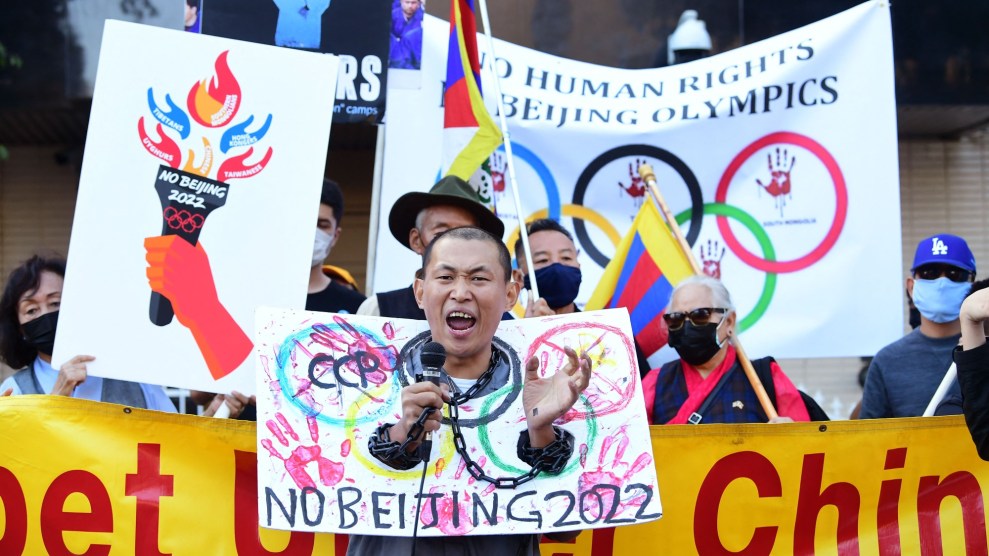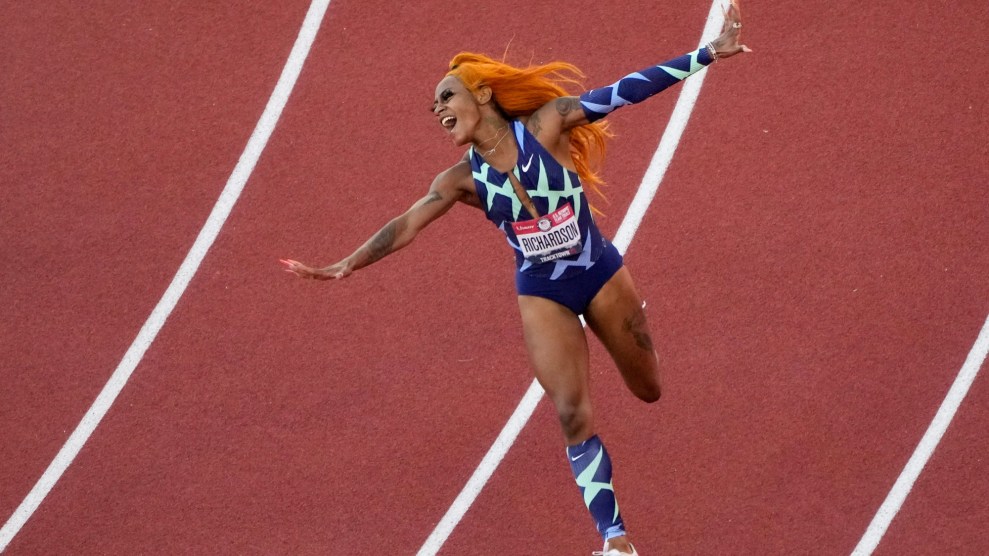
Team USA celebrate after the water polo women's quarterfinal match between Hungary and the United States at the Paris 2024 Olympic Games.Wang Yuguo/Xinhua/Zuma
When Veronica Fraley posted on X last week that she couldn’t afford her rent, the American discus star got help from a notable source. “I gotchu,” replied Flavor Flav, a founding member of the hip-hop group Public Enemy. “DM me and I’ll send payment TODAY so you don’t have to worry bout it TOMORROW,,, and imma be rooting for ya tomorrow LETZ GO,!!!”
Ahead of the Paris 2024 Olympic Games, Flavor Flav signed a five-year sponsorship deal with the US women’s and men’s water polo teams. And when it came to supporting Fraley as she competed for her country, he was joined by Reddit co-founder Alexis Ohanian. Meanwhile, other athletes have turned to fundraising platforms like GoFundMe to make it to Paris and beyond.
Many viewers tune in to the Olympics for these wholesome stories—an individual fighting through adversity to pull themself up onto the medal podium. But should we consider why these arduous journeys are needed in the first place?
There are some athlete groups that have been questioning this idea. Global Athlete, which describes itself as “an international athlete-led movement,” is among them. According to the organization’s website, its members are “collectively addressing the imbalance of power between athletes and administrators” by pushing for better pay and working conditions, as well as rights like freedom of expression.
Rob Koehler, the director general at Global Athlete, said in an interview that most of the problems the group is confronting come from the “outdated model” used by the International Olympic Committee, the non-governmental sports organization in charge of organizing the Summer, Winter, and Youth Olympic Games.
“The majority of athletes can barely pay rent. The facade of when you become an Olympian, you’re set for life is so far from the truth,” he said. “They’ve invested 15, sometimes 20 years of their lives, putting school aside, putting jobs aside, and committing to the goal of going to the Olympics. And when they’ve finished, they sit in their bed lying awake at night, wondering, ‘What am I going to do next?’ There’s no career path for them afterward. That’s the reality.”
“It’s time to put the most important stakeholder first, which are the athletes, and start distributing to everyone.”
When asked about athlete pay, the IOC’s media relations team pointed to a news release in which its executive board “expressed its full support for fair financial reward for athletes.”
According to public financial information posted on the IOC’s website, the committee—a privately funded non-profit association—earned $7.6 billion from 2017 to 2021. The IOC says that 90 percent of that revenue goes toward the Olympic Games, athlete development, and the Olympic Movement, which encompasses the IOC, the International Sports Federations, and the National Olympic Committees.
The same IOC release explains that the purpose of the national committees is “to develop the athletes, give them the best possible training and competition conditions, and support them in education and their daily life with regard to their profession.” Each of the 206 national committees choose the athletes to represent their country through a qualification process.
The document referred to a statement from IOC Athletes’ Commission Chair Emma Terho: “Rewarding athletes financially for their achievements at the Games is commonplace for many National Olympic Committees and governments, while International Federations help to develop their sport worldwide and close the development gap between the haves and the have-nots. Each role is important for the athletes, and for sport overall, because without this work, the disparities between athletes around the world would be much wider than they are today.”
But Global Athlete sees the situation differently. “They use rhetoric to say that the National Olympic Committees pay for gold medals. Not every country does, but that’s not the point here,” Koehler said. “Every single athlete attending the Games should be able to earn from the revenues.”
Koehler highlighted a study his group published in April 2020 in partnership with Ryerson University and the Ted Rogers School of Management that found that athletes only receive 4.1 percent of the Olympic Movement’s revenues via scholarships, grants, and achievement awards. In addition, just 0.5 percent of IOC funds go directly toward athletes, according to the study. Athletes are not allowed to negotiate these numbers.
Meanwhile, the five largest professional sports leagues in the world—the NFL, NBA, NHL, MLB, and English Premier League—distribute between 40 and 60 percent of their revenue to athletes.
In the lead-up to the 2020 Tokyo Olympic Games, the IOC updated the Olympic Charter’s Rule 40, which, according to the Global Athlete study, had previously prohibited competitors from profiting from their association with the Olympic Games through unapproved, non-Olympic corporate sponsors. But the April 2020 study suggested that the relaxation of the international by-law had been largely ineffective, since less than 10 national committees had actually implemented the change.
The IOC did not respond to a question about the study’s findings.
Koehler emphasized that athlete pay is not the only issue. He cited incidents at the Tokyo Games, specifically, where athletes were not permitted to breastfeed their babies while competing due to rules restricting bringing family and friends during the Covid pandemic.
“We worked with leading breastfeeding organizations, the athletes spoke up, and they were forced to change the rules,” Koehler recounted.
He also recalled the organization’s work with other athlete organizing groups to pressure the IOC to weaken Rule 50, which had stated, “No kind of demonstration or political, religious or racial propaganda is permitted in any Olympic sites, venues or other areas.”
Groups like Global Athlete and the International Labour Organization, a United Nations agency that sets international labor standards, stress that collective bargaining is essential to improve athlete rights.
While progress has been made, Koehler says that the IOC has blocked various pathways for athletes to engage in this bargaining. “The IOC Athletes Commission is required to sign the Olympic oath, which is a condition where you have to support all decisions of the IOC. You’ve lost your independence right away,” he stated. Because of this, athletes “sign away all their rights” when they attend the Games.
Koehler noted that the athlete agreement required for Paris competitors mandates that they waive rights like the ability to “bring any claim, arbitration or litigation, or seek any other form of relief, including request for provisional measures, in any…court or tribunal [other than the Court of Arbitration of Sport], unless otherwise agreed in writing by the IOC.”
Koehler argues that the IOC would actually benefit from negotiations with athletes, saying that in most cases, sports leagues with organized work forces have thrived due to increased buy-in from athletes. “If you look at the NCAA and what happened there, I think that’s the future for the IOC,” he said.
In May 2024, the NCAA, its five major Division I conferences, and legal representatives for athletes arranged to settle three lawsuits about the ways schools compensate their athletes. The deal determines how former athletes will share the $2.78 billion in damages that the NCAA will pay and builds a new system for revenue sharing.
That’s the future Koehler wants for the Olympics. “It’s time to put the most important stakeholder first, which are the athletes, and start distributing to everyone,” he said.
















